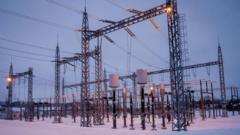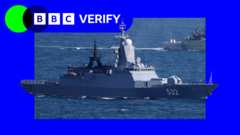In a historic move, the Baltic states have severed their reliance on Russia's electricity grid, joining the European Union's energy network. This transition, a culmination of long-term planning, enhances security in the region and responds to geopolitical tensions exacerbated by Russia's actions in Ukraine.
Baltic States Secure Independence from Russian Energy Supply

Baltic States Secure Independence from Russian Energy Supply
Estonia, Latvia, and Lithuania successfully transition to the EU power grid, marking a significant step toward energy independence and regional security.
The Baltic states of Estonia, Latvia, and Lithuania have officially disconnected from Russia's electricity grid, making a crucial move to join the European Union's power network. This strategic shift, which has been under consideration since 2007, was accelerated due to security concerns following Russia's invasion of Ukraine in 2022.
In a ceremony held in the Lithuanian capital, EU chief Ursula von der Leyen heralded the event as a momentous occasion for freedom from external threats. "Today, history is made," she stated, emphasizing that this transition marked "freedom from threats, freedom from blackmail." Polish President Andrzej Duda echoed this sentiment, declaring the event a "truly symbolic moment" that bolsters the security and resilience of the Baltic region.
Previously interconnected with the Brell power grid - an acronym representing Belarus, Russia, Estonia, Latvia, and Lithuania - these nations were vulnerable to Moscow's control over energy supplies. Although they stopped purchasing Russian electricity in 2022, reliance on the Brell grid remained a concern.
Von der Leyen warned of potential Russian retaliation in light of the ongoing tensions and recently noted a troubling trend of sabotage against undersea cables and pipelines in the Baltic Sea. Over the past year and a half, at least eleven cables have suffered damage under suspicious circumstances, including a recent incident allegedly involving a Russian oil tanker damaging Estonia's primary power link.
Lithuanian President Gitanas Nauseda has called for sanctions against Russia's shadow fleet in response to these threats, signaling growing apprehension among Baltic leaders. Although NATO has not explicitly blamed Russia, it has initiated a new regional security patrol mission called Baltic Sentry.
The ambitious project to transition to the EU grid required an investment of approximately 1.6 billion euros, primarily funded by the EU. Over the course of two days, the three Baltic states converted their energy framework, functioning as an "energy island" for 24 hours before officially linking to the EU power grid.
Ukrainian Energy Minister German Galushchenko praised the move, declaring it a significant triumph for Europe as a whole.





















